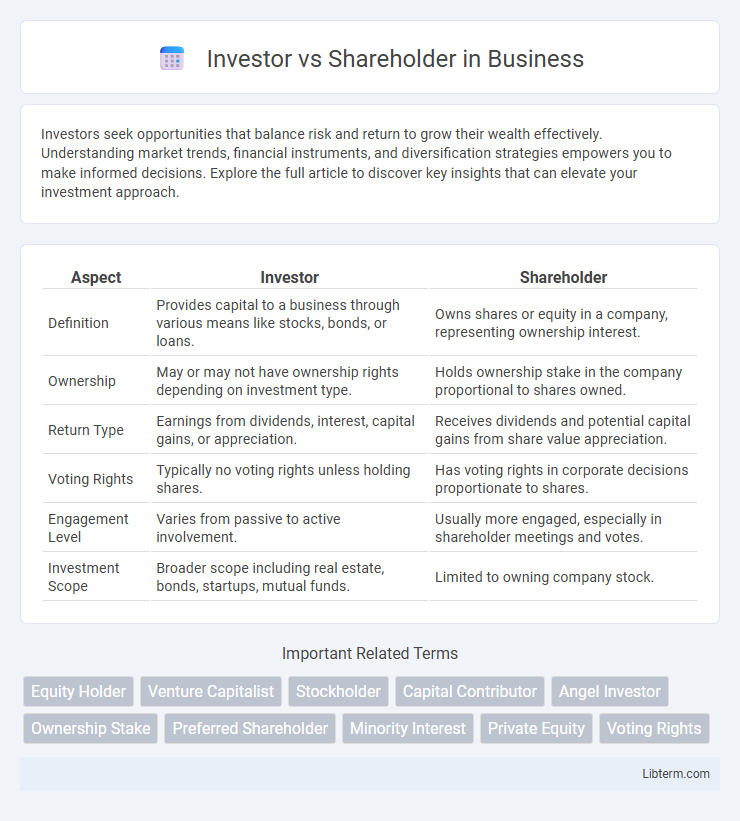Investors seek opportunities that balance risk and return to grow their wealth effectively. Understanding market trends, financial instruments, and diversification strategies empowers you to make informed decisions. Explore the full article to discover key insights that can elevate your investment approach.
Table of Comparison
| Aspect | Investor | Shareholder |
|---|---|---|
| Definition | Provides capital to a business through various means like stocks, bonds, or loans. | Owns shares or equity in a company, representing ownership interest. |
| Ownership | May or may not have ownership rights depending on investment type. | Holds ownership stake in the company proportional to shares owned. |
| Return Type | Earnings from dividends, interest, capital gains, or appreciation. | Receives dividends and potential capital gains from share value appreciation. |
| Voting Rights | Typically no voting rights unless holding shares. | Has voting rights in corporate decisions proportionate to shares. |
| Engagement Level | Varies from passive to active involvement. | Usually more engaged, especially in shareholder meetings and votes. |
| Investment Scope | Broader scope including real estate, bonds, startups, mutual funds. | Limited to owning company stock. |
Defining Investors and Shareholders
Investors are individuals or entities that allocate capital to assets with the expectation of generating financial returns, encompassing various forms such as stocks, bonds, real estate, and startups. Shareholders specifically hold ownership shares within a corporation, granting them partial ownership rights and potential dividends based on the company's performance. While all shareholders are investors in a company, not all investors are shareholders, as investors may choose other investment vehicles beyond equity stakes.
Key Differences Between Investors and Shareholders
Investors provide capital to various assets, including stocks, bonds, or real estate, seeking financial returns, while shareholders specifically own shares in a corporation, making them partial owners of that company. Investors may or may not hold equity positions and can invest in diversified portfolios, whereas shareholders have voting rights and influence corporate decisions according to their shareholding. The key difference lies in the nature of ownership and control, with shareholders having legal claims and responsibilities within the company, contrasting with investors who may only have financial interests.
Types of Investors in the Market
Investors in the market can be categorized into several types, including retail investors who buy stocks for personal portfolios, institutional investors such as mutual funds, pension funds, and insurance companies that manage large pools of capital, and venture capitalists who provide funding to startups and early-stage companies. Shareholders, specifically, are investors holding equity in a company, gaining ownership rights and potential dividends. Understanding these distinctions helps clarify the roles and influence each type of investor has within financial markets.
The Role of Shareholders in a Company
Shareholders play a crucial role in a company by providing capital through the purchase of stock, which enables business growth and operational funding. They possess voting rights that influence key decisions such as electing the board of directors and approving major corporate policies. Unlike general investors who may invest in various assets, shareholders have a direct stake in the company's performance and governance.
Legal Rights of Investors vs Shareholders
Investors typically have contractual rights defined by investment agreements, including rights to information, dividends, and exit strategies, whereas shareholders possess statutory rights under corporate law, such as voting on major decisions, electing directors, and receiving dividends. Shareholders' legal protections are enshrined in company bylaws and securities regulations, ensuring rights like inspecting books, attending meetings, and approval of mergers or acquisitions. Investors' rights may vary depending on the investment type and negotiated terms, often offering less control but tailored protections compared to shareholders' broader governance influence.
Financial Goals: Investors vs Shareholders
Investors seek diverse financial goals, including capital appreciation, income generation, and risk management, by allocating funds across various assets, while shareholders primarily aim for long-term value growth and dividend income through equity ownership in specific companies. Investors often balance portfolios to achieve targeted returns and mitigate losses, whereas shareholders focus on the performance and governance of individual corporations to maximize stock value. Understanding these distinctions helps in tailoring investment strategies based on whether the emphasis is on broad financial growth or company-specific equity benefits.
Decision-Making Power and Influence
Investors provide capital to a company and may have limited decision-making power unless they hold significant ownership stakes or special classes of shares. Shareholders, as legal owners of shares, possess voting rights that directly influence corporate governance, board elections, and major strategic decisions. The extent of influence depends on the proportion of shares owned and the specific rights attached to those shares.
Risks and Rewards: Comparing Investors and Shareholders
Investors typically assume higher risks by engaging in diverse asset classes, aiming for substantial capital gains and portfolio growth, while shareholders own equity in specific companies, facing risks tied to corporate performance and market fluctuations. Shareholders benefit from dividends and voting rights, directly influencing company decisions, whereas investors may receive broader returns like interest, dividends, or capital appreciation depending on the investment vehicle. Understanding the distinction in risk exposure and reward mechanisms is crucial for aligning financial goals and investment strategies.
Impact on Corporate Governance
Investors influence corporate governance primarily through the allocation of capital and voting power, shaping board composition and strategic direction. Shareholders, as legal owners of company stock, exercise governance rights such as voting on key matters, impacting executive compensation and policy decisions. The degree of influence depends on the size and engagement level of investors and shareholders, affecting transparency, accountability, and long-term value creation.
Choosing Your Path: Investor or Shareholder?
Choosing your path as an investor or shareholder depends on your financial goals and involvement preferences. Investors typically seek diversified portfolios and capital gains through strategic asset allocation, while shareholders focus on ownership stakes and dividends in specific companies. Understanding the differences in risk, return, and control helps tailor your approach to wealth building and corporate engagement.
Investor Infographic

 libterm.com
libterm.com